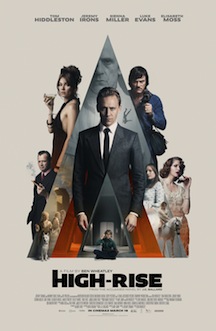Directed by Ben Wheatley
Country: UK / other
As an unconditional admirer of Ben Wheatley’s work, I must admit I was expecting slightly more from “High-Rise”, an impractical adaptation of J.G Ballard’s 1975 novel of the same name. However, I'm not disappointed either because I enjoyed the bizarre, lustful, surreal, and psychedelic tones that the film has to offer, in addition to a mordant humor, which is already a staple in Mr. Wheatley’s projects (“Sightseers”, “A Field in England”).
Set in a dystopian near future that is evocative of the 70’s, the film stars Tom Hiddleston in the mesmerizing role of Dr. Robert Laing, an unceremonious physiologist who is more than happy to move into a monumental apartment building where the social class of a person determines in which floor they live. There, he meets a bunch of curious characters, starting with the voluptuous Charlotte (Sienna Miller) who lives right above him and was telling Richard Wilder (Luke Evans), a failed documentarian who lives on an upper floor, that he’s not her type.
Wilder is married to the extremely fertile, Helen (Elisabeth Moss), who is pregnant again and spends her time making parties for kids.
Laing is invited to different kinds of parties, in which he tries to learn how the things work there, including one of the highest and consequently fanciest floor where the architect of the building, Anthony Royal (Jeremy Irons) lives an agitated life with his wife. Royal likes Laing but this particular party wasn’t a so positive experience for the latter.
The building, portrayed as a trap, offers everything its tenants might desire except mental sanity. There’s a swimming pool, a supermarket, sports fields, and a gym. Every character brings a bit of mystery to the story since we have the notion there’s something hidden and waiting to be disclosed.
The delirious “High-Rise”, suffused with infidelities, whims, parties, and brawls, is a strong social satire that interlinks the bourgeois status (with all its privileges) and moral decadence.
The oppressive air comes to us through satisfying portions of irony and edgy irreverence, in a stylistic effort that you can think of something close to Franz Kafka meets Peter Greenaway. Also, the dashing visuals and musical score were highly influential in our general perception.
Not everyone will be pleased with a freewheeling story that features a group of dysfunctional characters inhabiting a dysfunctional building. Nevertheless, Mr. Wheatley, who shows a curious inclination for slow-motion scenes, and the screenwriter Amy Jump, did the impossible. Even faulty here and there, the film pays off.


